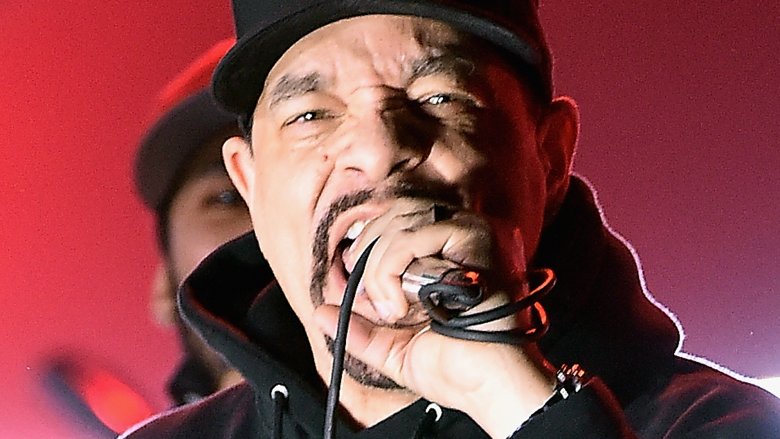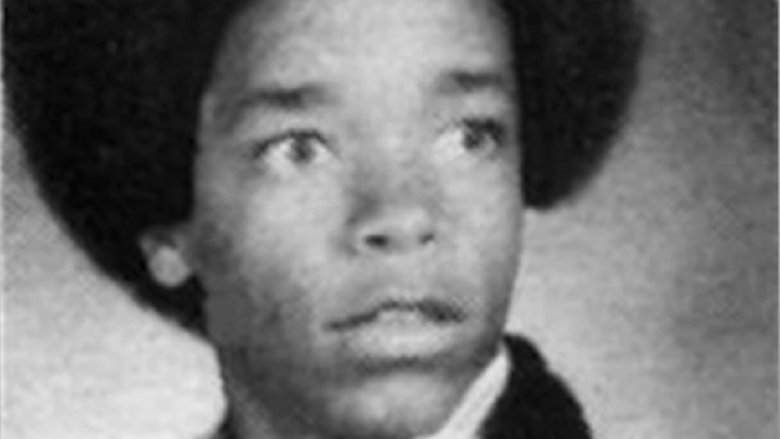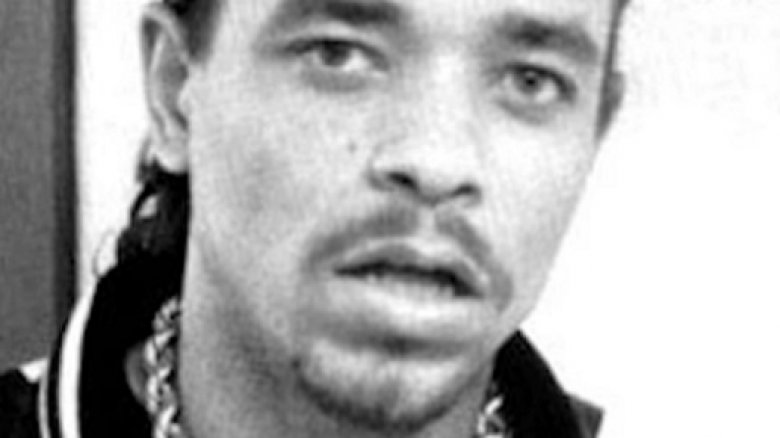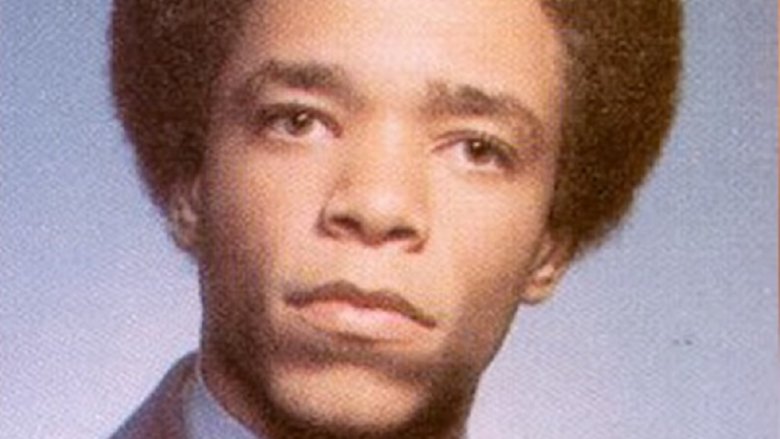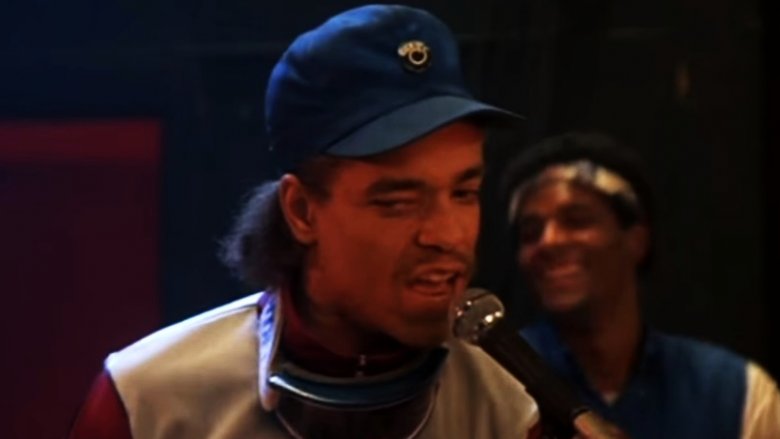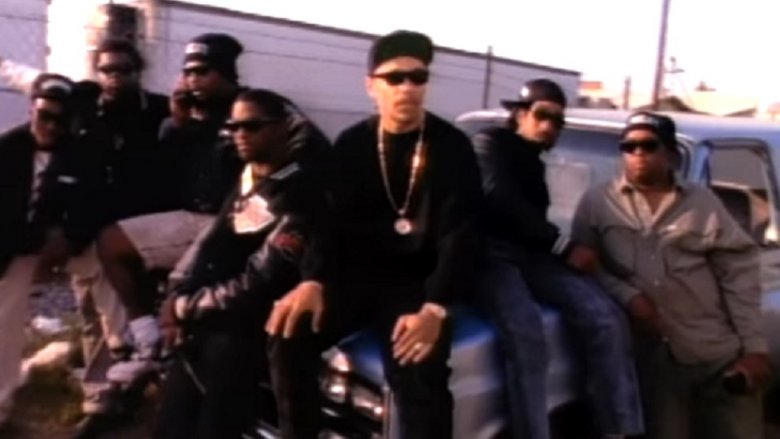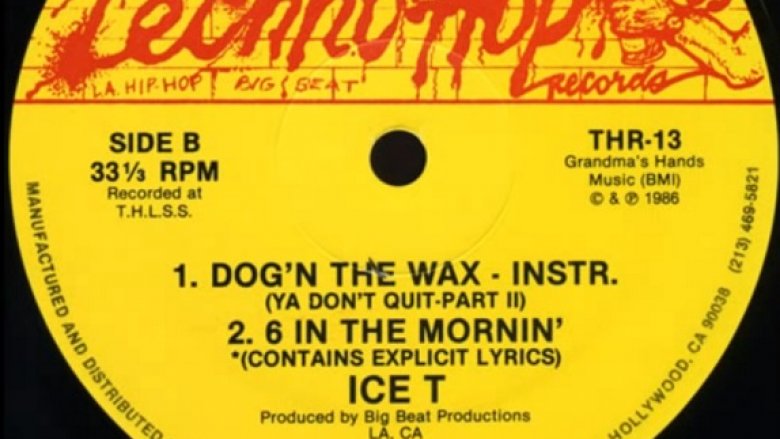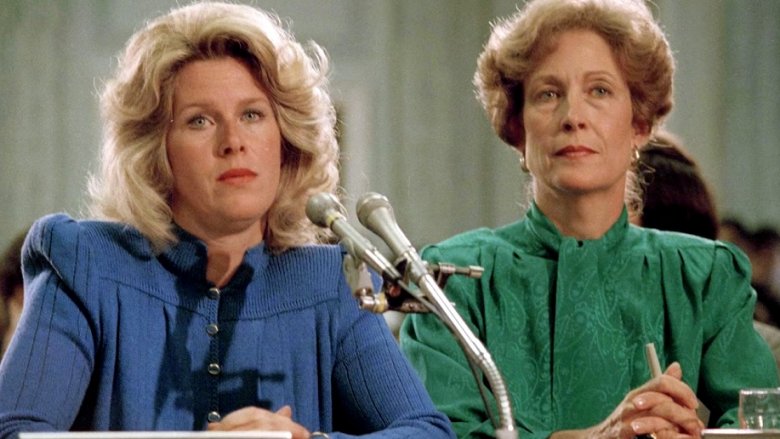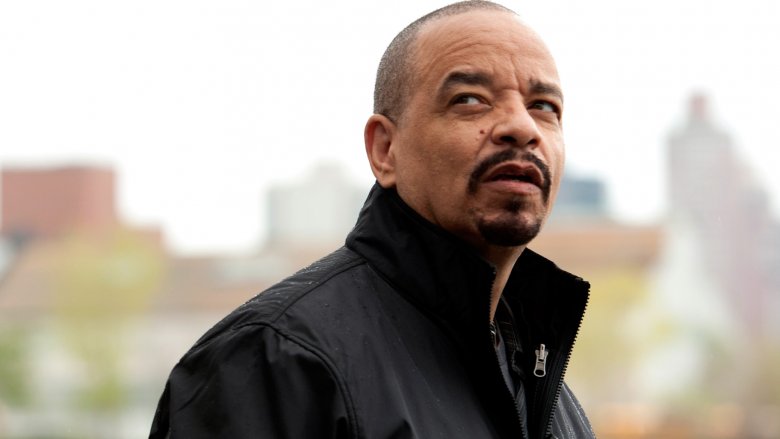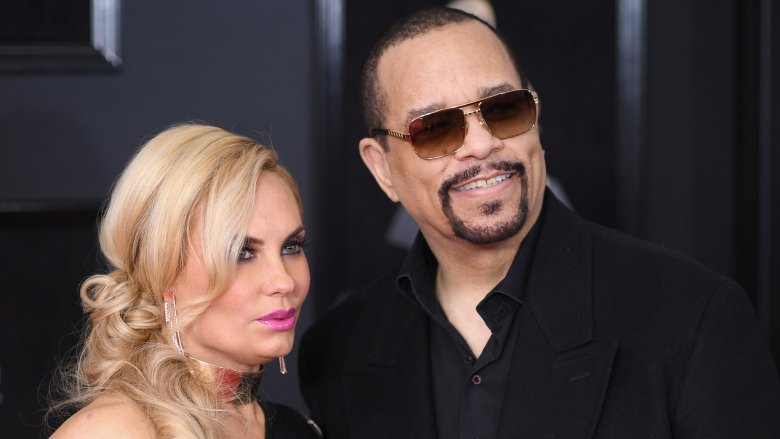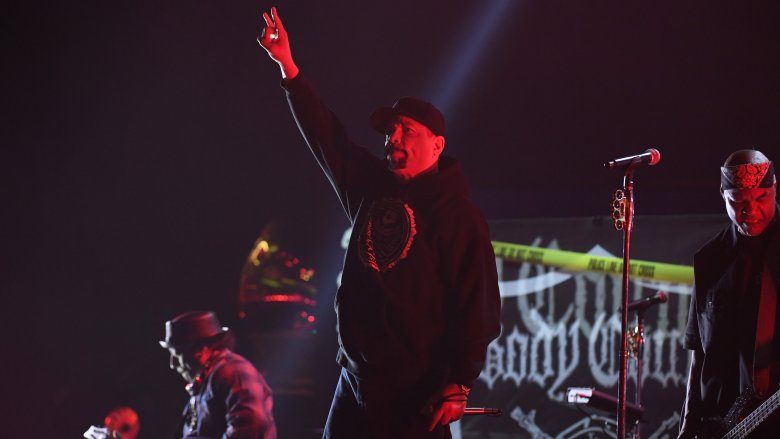How Ice-T Went From Orphan To Superstar
You may know him best for loving Coco and for portraying Detective Odafin "Fin" Tutuola on Law and Order: Special Victims Unit seemingly forever, but Tracy Lauren Marrow — known to the world at large as Ice-T — is one of the greatest lyricists of rap's golden age. In a genre known for its immediacy and directness, Ice was more immediate and direct than most, with a style that often made it seem as though he were talking directly to you. This was no accident; his manner of communication was informed by virtue of having one of the most colorful, craziest lives imaginable before ever setting foot in a spotlight.
He rose from nothing to become one of the first major players on the L.A. rap scene, the first hip-hop artist to front a heavy metal band, and a persistent thorn in the side of hypocritical authority figures. It may have been his blazingly ironic SVU role that made him a household name, but it was sheer dogged determination and a resolute unwillingness to compromise his principles that made him a star — and if you think he's gonna mellow out now that he's turned 60, well, think again. This is the incredible path that led Ice-T from orphan to superstar.
Twin family tragedies
Young Tracy Marrow had a pretty nondescript suburban childhood in north New Jersey, and as a child was about as far away from "gangsta" as you could get. In his book Ice: A Memoir of Gangster Life and Redemption, he called his early years "just a real middle-American life... There wasn't any violence or trauma. It was quiet, simple, and suburban. An almost perfect childhood — except, for me, every couple years, losing a parent." When Ice was in the third grade, his mother — only in her early 30s — died of a massive heart attack, leaving the young boy to be raised by his father and a paternal aunt who often chipped in. It wasn't an ideal situation, but it got a whole lot less ideal only four years later, when Ice's father passed away of the exact same cause.
Ice recalled that even at the tender age of 12, he "didn't have an ounce of self-pity" for his situation, and in fact didn't shed a tear over either parent's death. "Everybody in the family was bugging out that I didn't cry when my father died. They remembered how I hadn't shed a tear for my mother, either," he recalled. "But I just wasn't built like that. Wasn't wired like that. ... Even as a 12-year-old kid, I knew I was going to have to make it on my own, and my survival instincts were kicking in." It's pretty awful to grow up running on survival instincts, but we're all glad this young man made it through.
He moved to L.A. and made up a fake gang
Shortly after his father's death, Ice was shipped off to L.A. to live with another aunt. He described a slight case of culture shock in an interview with The A.V. Club, saying, "Welcome to L.A. — hey, guess what? We've got gangs. Something I wasn't dealing with in New Jersey and New York." For awhile, he managed to stay neutral; he was bussed to school in upper-class Culver City, until he and some friends decided they would rather attend Crenshaw High. The only problem: Crenshaw was a notorious Crip school, and Ice found out pretty quickly that these guys took this gang stuff pretty seriously.
Since Ice and his buddies weren't down with any particular set, they circumvented the issue by simply inventing one. "There was like, three or four of us who came from that group and went to Crenshaw," he recalled. "We actually created a fake gang. We told people we were part of the Hillside Crips. We had them thinking there was hundreds of us... We created this other, I guess you could say shell corporation that didn't actually have backup but it kind of kept people off of us." Ice's personality and charisma helped sell the lie and endear him to the school's shot-callers, but in his senior year, his life took an unexpected detour due to a very typical teenage mistake.
Being all he can be as a teen father
Despite cozying up to the gangs, Ice was still a good kid, and made every effort to keep his grades up — he even admits to "acting like I was ditching class when I was really ditching my friends so I could slip back to school." But in 12th grade, he got his girlfriend (who was two years younger) pregnant, and decided that there was only one way he could legitimately provide for his new family: by joining the Army.
While he would later be dismissive of the experience in his tune "That's How I'm Livin'" ("Four years in that sh*t, be all f*cked you can be"), he admitted to the A.V. Club that it helped shape him in the absence of a father figure: "I think men, growing up, you have to go through some form of hardship. You've got to harden the metal," he mused. "I would go to the military or prison. Somebody got to smack you in the face and tell you, 'Life ain't easy. Man up.'" His relationship with his baby's mother didn't survive his tour of duty, however, and upon his return to Los Angeles he found that there shockingly weren't a whole lot of legit job opportunities for young, black Army vets who were also single fathers. But all of his buddies were still there, and during his absence they hadn't been playing Parcheesi.
The hustler years
In his edition of VH-1's Behind the Music, Ice remembers his friends picking him up from the airport in a gleaming new Mercedes. "They said, 'Yo, this is what we're doing right now.' [I said], well, what are we doing right now?" The answer: smash-and-grab jewelry store heists. Ice's military discipline made him an ideal point man for such risky operations, and he and his crew enjoyed a brief period of success as high-end jewel thieves, which he can talk about now due to a handy thing called the Statute of Limitations. This was followed by a stint as a full-on pimp, a time which saw Ice develop the persona that would later serve him well in less illegal endeavors.
Ice had long been fascinated with the works of street poet Iceberg Slim, whom he would quote at length to his friends, prompting them to ask him to "kick some more of that Ice, T" (which answers that question). One day while getting his hair done in the salon in true pimp fashion, he was entertaining the patrons with rhymes when one of them — a local record label owner — asked him if he wanted to "make some money with that." The encounter would lead to Ice's debut 1983 single "The Coldest Rap," and before long, he was he was being scouted to potentially appear in a movie about this newfangled rappin' business. Ice wasn't convinced this was a viable career path — but fortunately, his friends were.
Just because they're crooks doesn't mean they're not good friends
"Everybody that I was rolling with started to go to jail," Ice later recalled in an interview with the Guardian. "I was in as deep as I could get and my friends started to go under... to live every day with the potential of somebody blowing your brains out is not as sexy as it sounds." These friends began to counsel him, some of them from behind bars, that the criminal lifestyle was in fact not engineered for maximum longevity. After initially turning down the offer, he accepted the piddly sum of $500 per day to appear in Breakin', the 1983 film that helped hip-hop edge closer to the national spotlight.
Ice would use the raised profile afforded by the movie to further his burgeoning rap career, but something was just amiss. As he would later recount in the title track to his album O.G. Original Gangster, "I used to listen to rappers flow / Talking 'bout the way they rocked the mic at the disco... So I tried to write rhymes something like them / My boys said, 'That ain't you, Ice, that sh*t sounds like him / So I sat back, thought up a new track / Didn't fantasize, kicked the pure facts." The little ditty he was referring to dropped like a nuclear warhead on the nascent L.A. rap scene — and a new genre, for better and worse, was born.
He invented gangsta rap
The opening verse of 1986's Six 'N the Mornin'" establishes its narrator as the type of character not seen in hip-hop until this point: "The streets to a player is the place to be / Got a knot in my pocket, weighs at least a grand / Gold around my neck, my pistol's close at hand / I'm a self-made mobster of the city streets / Remotely controlled by hard hip-hop beats." This guy is then sent on an epic, sprawling, decade-encompassing tale of crime and punishment that set the template for what would come to be known as gangsta rap.
Ice admittedly had more than a little inspiration in the form of Philadelphia rapper Schoolly D's 1985 single "P.S.K. What Does It Mean?" While not explicitly a gangster narrative, Schoolly's track featured not only tough street talk, but a rap style nearly identical to the one that Ice would employ for his tune ("Call it a bite or what you will," Ice said in a later interview, "but I dug that record"). "6 'N the Mornin'" would appear on Ice's 1987 debut LP Rhyme Pays, and the tune prompted actor/director Dennis Hopper to tap Ice to provide the title track to his 1988 gang film Colors, further cementing his status as the godfather of gangsta rap. Incidentally, in a grim bit of foreshadowing, Rhyme Pays was the first rap album to ever carry a Parental Advisory sticker. (It's still one of the best ways to make kids want to buy an album that most parents will hate.)
Weathering the censorship storm
In the mid-'80s, the U.S. government — by way of the innocuously named Parents' Music Resource Center, or PMRC — basically declared war on any music featuring lyrics that were any less than squeaky clean. Initially focusing their efforts on such notorious corrupters of youth as Madonna and Prince, the rise of gangsta rap gave the PMRC and their ilk a big, fat target — and Ice-T, never one to mince words about anything, had plenty to say about it.
On the title track to his tellingly titled third album The Iceberg: Freedom of Speech... Just Watch What You Say, Ice leveled the PMRC and the city of Columbus, Georgia (which had taken to locking up artists under its "indecency statute"), pointing out the futility of censorship and the hypocrisy of sworn defenders of the First Amendment seemingly being willing to tear it to shreds. But the real fun started when Ice released the debut album by his all-black heavy metal band Body Count, which featured a lively little ditty called "Cop Killer." Then-president George H.W. Bush and his VP Dan Quayle — in the midst of a re-election campaign — became obsessed with the song (Ice recalls Bush "saying [his] name in anger" on television), and the world was treated to the bizarre sight of then-NRA president Charlton Heston reading the song's lyrics, context-free and in a deadpan monotone. The tune's cry of rage against police brutality didn't exactly endear Ice to the law enforcement community — which made his next career move a bit puzzling.
The most ironic career segue ever
Right in the middle of all this brouhaha, Ice confounded everybody by appearing in Mario Van Peebles' 1991 gangster epic New Jack City, playing perhaps the most unlikely role anyone could think of — that of an undercover cop working to infiltrate a crime syndicate. As it turned out, his life experiences made him a perfect fit for the part — and he absolutely killed it, parlaying the appearance into a steady stream of film roles throughout the '90s. As his rap career began to wind down later that decade, he accepted a four-episode guest spot on Law and Order: Special Victims Unit, a new spinoff of the venerable series. Hitting it off with the cast, he lobbied to join the show permanently — and twenty freaking seasons later, he's still a key part of the ensemble.
Speaking with Jimmy Fallon on his show, Ice pointed out that Gunsmoke currently holds the record for longest-running primetime drama, and expressed his optimism that SVU will take that crown. If it seems a little surreal that the O.G. rapper has pulled down a steady, legal paycheck for two decades playing a cop, well, Ice wouldn't necessarily disagree. Asked by Fallon if he ever pictured himself appearing on TV while growing up, Ice deadpanned, "America's Most Wanted, maybe."
Why not reality TV?
Ice has long asserted, even as far back as his Behind the Music episode in 1999, that he views the entertainment industry as one great big hustle — and if that's true, then its '00s obsession with reality TV must have looked like the biggest, easiest hustle of them all. He may have arrived a little late to the party, but in 2011, he and wife Coco Austin signed on for the E! reality series Ice Loves Coco, which detailed the day-to-day lives of the Original Gangster and his bride for three seasons.
In true Ice-T fashion, he decided to end the series in 2014 not because its audience was declining, but simply because he was bored and ready to move on to the next hustle. In an interview, he elaborated, "You can only do so much with reality TV — when you're doing reality television, at some point, you start to loop... you get it: I play video games, I eat sausage sandwiches." Ice has plenty more in the pipeline, but he and Coco will always have a memento of their time as reality stars: baby daughter Chanel, who was born shortly after the show's run and is one of the only babies in the world that has way more Instagram followers than you will ever have.
Still OG after all these years
He may be older, greyer and a new-ish father, but none of those things are keeping Ice-T from crushing it at life on a daily basis. In addition to his regular SVU gig, he branched out as the host of Oxygen Network's In Ice Cold Blood, a true-crime series focusing on particularly lurid acts. And that doesn't mean he's done with music — far from it. He continues to tour and record with Body Count, and they're no nostalgia act; their 2017 howl of rage Bloodlust was warmly received by fans and critics, and the band quickly returned to the studio for their next LP. Their shows are as full of energy and righteous fury as ever, even if now they sometimes involve brief cameos from a small toddler.
But for fans who want a pure, unfiltered hit of T, look no further than Ice's Twitter account, which he maintains diligently and sprinkles liberally with the kind of no-BS, common-sense wisdom that those familiar with his music have come to expect. He may be as old as your dad, but he created one of the most controversial musical genres of all time, loves video games, knows how Twitter works, and makes kickass metal albums with his awesome band. Maybe your dad just needs to step up his game.
